Gavia
-
- Advances in Robotic Vehicle Technology Marine Technology, Mar 2014 #32
Advances in robotic vehicles continues to push technological limits and open new markets.
Autonomous Surface Vehicles (ASV) Ltd. launched what it is calling a revolutionary oil field services unmanned surface vehicle. ASV announced a breakthrough in unmanned oil and gas operations with the introduction of C-Worker. The multiuse offshore unmanned surface vehicle has been developed to conduct subsea positioning, surveying and environmental monitoring.
C-Worker demonstrated to members of the oil and gas and offshore surveying industries in January 2014 when ASV, alongside sister company C&C Technologies, operated the vehicle in the Solent off Portsmouth, U.K. Fitted with a Sonardyne Gyro USBL acoustic positioning system, the vehicle successfully executed seabed positioning and Compatt calibration as well as station keeping and following survey lines.
C-Worker leverages technology from more than 50 unmanned vehicles ASV has built to date. Additional technological advancements introduced in the C-Worker include the integration of a variety of offshore payload combinations including USBL, ADCP (current meter), CTD, Multibeam Sonar, Acoustic Telemetry and Passive Acoustic Sonar (PAM) for marine mammal detection. Payloads can be developed by ASV or by customers who are supplied an empty payload frame and a software and power interface specification. The C-Worker’s navigation sensor suite is comprised of C-Nav DGNSS, color and light cameras, an infra-red pan tilt camera, an x-band marine radar and AIS.
Another Tiger ROV to Indonesia
Seascape Surveys of Singapore acquired its third Saab Seaeye Tiger ROV for operations in Indonesia. “The Tiger offers a good combination of size and power for jacket inspections,” said Seascape’s managing director, Peter Reichlmeier. He said that Tigers are used for digital inspection work of subsea jackets, platforms and other structures: “We have been using Tigers for this work for the last four years and find them reliable and versatile.”
He said they will install the system on a newbuild DP2 vessel, Resolution, on long-term charter from Miclyn Express Offshore.The acquisition is in line with Seascape’s continued growth in the Southeast Asia Region where their main operations are in Indonesia, with other areas including Thailand and Timor Leste Australia. The 1,000-m-rated Tiger has a proven pedigree in the oil and gas industry, where operators value its maneuverability inside structures and its ability to cope with strong currents. Despite its compact size, a range of sonars, cameras and tools can be added as needed to undertake a wide scope of tasks. Supplying the Tiger was Singapore-based Saab Seaeye distributor, Oceanvision.
Polish Forces Take Delivery of Teledyne Gavia AUVs
Teledyne Gavia completed a contract with the Armament Department of the Polish Ministry of Defense for the delivery of two Gavia Defense AUV systems for mine countermeasures (MCM). The provision includes all required topside equipment and AUV operation and maintenance training. Teledyne Gavia completed a competitive tender process for delivery of the first MCM AUVs into Poland, winning the contract on the basis of best value with conformance to the required functional and technical parameters. The Gavia vehicles delivered are equipped with the EdgeTech 2205 side scan sonars. The simultaneous dual frequency 600/1,600 kHz EdgeTech 2205 side scan sonar and the Kearfott T24 inertial navigation system (INS) allow the Gavia to gather high resolution, accurately navigated, sonar images while remaining submerged for several hours of continuous operation at survey speeds up to five knots. The addition of a high accuracy GPS and the augmentation of the INS by Long Base Line (LBL) beacons ensures precise navigation during even longer duration and deeper missions. This combination of sensors make it ideal for mine countermeasures (MCM) and search and salvage operations, in continental-shelf waters and beyond.
The Polish Armed Forces also purchased SeeTrack Military software from SeeByte Ltd. The SeeTrack Military MCM Evaluator software package includes all core MCM options: PMA Automatic Target Recognition; Seafloor Classification; Change Detection; and SeeByte’s Performance Analysis and Training Tool. The software provides a solution for rapid on-site analysis and fusion of sensor data for the fleet of Gavia AUVs, rapidly generating targeted information from the AUV data.
The sea acceptance trials took place at the Teledyne Gavia proving grounds near Kopavogur, off the west coast of Iceland. The tests were supervised by representatives of the Polish Navy, and the results were checked by specialists from four District Military Division (Gdansk). Data analysis during the SATs and training confirmed the vehicle performance and suitability for MCM search, location and identification missions. The vehicles were supplied through Enamor Ltd. (Gdynia, Poland), Teledyne Gavia’s official representative in Poland. Enamor is a research and production company focused on new technology and active in many projects in Poland in the fields of navigation, communication, hydrography and automation.
The Gavia Defense AUV has a low-logistics, fully modular design. This facilitates rapid transport and maintenance, and is designed to increase operational availability and reliability. Each Gavia can also be equipped with a variety of additional sensor modules. This creates an asset which can be configured for MCM, search and salvage or hydrography missions, without needing to be dedicated to just one task. In the future, the AUVs delivered in Poland can be equipped with modules for multi-beam bathymetry, sub-bottom profiling or even submarine emulator sonar training targets.
This contract marks the first purchase of AUVs for MCM by the Armed Forces of Poland. The knowledge gained from operating the Gavia AUVs will help develop the concept of use of AUVs in the Polish maritime theatre. Significant benefits are expected from a low-logistics AUV asset that can carry out both MCM and hydrography missions.
ROVOP Starts 2014 with Growth
ROVOP has expanded its fleet of remotely operated vehicles (ROVs) by taking delivery of four new hydraulic work class systems with a further four new ROVs expected later in the year. The company has invested $20 million in the four hydraulic Schilling HD work class ROVs, which were delivered during January, and is working to grow its offshore team by 50 to 110.
ROVOP has also invested in its own ROV simulator for its in-house Academy in order to further develop the training and competence of its offshore staff. Addressing the talent shortage in the subsea industry, the Academy seeks to build skill and competence in offshore personnel whatever their current career level.
The $350,000 simulator enables ROV pilots to hone their skills onshore, in physics-accurate conditions.
Headquartered in Westhill, Aberdeenshire, ROVOP is an independent company which is 100% focused on providing ROVs and services to the oil and gas and offshore wind industries.
The company’s latest ROVs have been manufactured by FMC Schilling Robotics and were put through their paces during acceptance testing by the ROVOP team. The ROVs are equipped with the latest Hammerhead control system, which gives pilots the ability to use an increased suite of auto functions, including automated manipulator control.
The systems are designed around the 60-minute repair philosophy, which is unique to Schilling work class ROVs, and fitted with the latest Teledyne CDL TOGS-NAV (Tiny Optical Gyro System for navigation) technology unit which combines DVL, Fiber Optic Gyro and depth sensors in one compact package to provide maximum ROV control for safe and efficient working.
Steven Gray, ROVOP’s managing director, said, “ROVOP enjoyed strong business growth in 2013 and this is set to continue in 2014. In order to deliver the best in class service, we are continuing to invest in the latest and most advanced equipment on the market, staffed by the best people, to ensure we are at the forefront of technology, reliability and competence.
“Delivery of the highest quality of service is enabled by our secure internet accessible management system. The system, which has now also achieved ISO 9001 certification, ensures the business operates as robustly and effectively as possible, with considerable cost savings for both ROVOP and our clients.”(As published in the March 2014 edition of Marine Technology Reporter - www.seadiscovery.com)
-
- MTR100 '13: Teledyne Benthos, Teledyne Webb Research & Teledyne Gavia Marine Technology, Jul 2013 #49
Teledyne Marine Systems includes Teledyne Benthos, Teledyne Webb Research and Teledyne Gavia, all with rich histories in the marine industry. The oceanographic equipment we design and develop allows scientists, industry and governments to gain valuable information from the world’s oceans. While its
-
- MTR 100: Teledyne Marine Systems Group Marine Technology, Jul 2014 #36
of the companies in your group, citing examples of group collaboration. The Teledyne Marine Systems Group consists of Teledyne Benthos, Teledyne Gavia, and Teledyne Webb Research. The group focuses on the development, production, and support of underwater vehicles and tow-bodies, acoustic communication
-
- Autonomy Takes Off Underwater Marine Technology, Jan 2015 #14
Admiral Fred Byus, USN (Ret.), Battelle; Richard Mills, Product Sales Manager for AUVs, Kongsberg Maritime AS; Stefan Reynisson, General Manager, Teledyne Gavia, and Graham Lester, VP Sales & Marketing, Hydroid Inc. for their insights. Briefly describe your company’s offering to the AUV market. Reynisson
-
- PART I:Teledyne Marine Sensors & Systems Marine Technology, Aug 2015 #18
towed systems, undersea positioning and telemetry, and deep sea infrastructure. The Teledyne Marine Systems group includes Teledyne Benthos, Teledyne Gavia, Teledyne SeaBotix, and Teledyne Webb Research, all with rich histories in the marine industry. Teledyne Marine Systems product lines draw upon shared
-
- Mega Machines Unmanned Systems take Center Stage Marine Technology, Jan 2014 #38
or without ROV sensor data overlay. In Development for the system are: • Articulated Claw “Hook-Grab-Cut” • Laser Scaling • 3D HD Camera Teledyne Gavia said that it sold two additional 1,000m depth rated Gavia Offshore Surveyor Autonomous Underwater Vehicles (AUVs) to UTEC Survey Inc. of Houston. UTEC
-
- Unmanned Vehicles: 25 Years of Milestones Marine Technology, Jan 2019 #26
by modern electronics, design, and manufacturing techniques. In QinetiQ North America’s SEAScout we see a compact, simple approach. Teleynde’s Gavia offers modularity for payload and system components, and the Riptide UUV family leverages open source approaches to be especially user-friendly.QinetiQ
-
- EdgeTech System for Polish Defense AUVs Marine Technology, Apr 2014 #59
AUV systems have embraced the high quality sonars which were traditionally only available in larger sized AUV systems. The recently delivered Teledyne Gavia AUVs to the Polish Ministry of Defense for mine countermeasure’s (MCM) were equipped with the latest EdgeTech 600/1,600 kHz simultaneous dual frequency
-
- 5 Minutes with Mike Read, President, Teledyne Marine Marine Technology, Jul 2018 #30
seafloor. Teledyne is a one-stop supplier of surface, shallow, mid, and deep water unmanned vehicles and towed systems. Vehicles brands include: Benthos, Gavia, Oceanscience, SeaBotix, and Webb Research, and new tech for 2018 includes:Teledyne Gavia SeaRaptor AUV is a survey grade deep water AUV designed to
-
- Meet The "Teledyne Twelve” Marine Technology, Jul 2013 #44
for gliders, the Littoral Battle Space Gliders, a contract to provide 150 gliders for the Navy to provide oceanography to the fleet which was won in 2009. Gavia in Iceland presented an exciting technology ready to blossom. In Gavia, we acquired a propeller driven underwater autonomous vehicle; Low logistics
-
- Teledyne Maintains Course Marine Technology, Aug 2016 #33
E-mail: [email protected] | www.teledyne-reson.com Teledyne Marine Vehicles Teledyne Benthos see listing under Instruments. Teledyne Gavia provides turnkey survey solutions for military, commercial, and scientific applications. The GaviaAUV carries an array of sensors and custom payload
-
- Advancing Climate Change Research and Hydrocarbon Leak Detection Marine Technology, Mar 2013 #18
sensor technologies with other Teledyne Instruments, Inc. product offerings. Examples are the Teledyne Benthos, Teledyne Webb Research, and Teledyne Gavia tethered, towed, and autonomous vehicles. The HydroCH4 sensor may be combined with the Teledyne TSS Pipe Detection system via the Mobile Early Leak
-
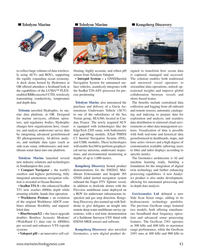 )
May 2025 - Marine Technology Reporter page: 43
)
May 2025 - Marine Technology Reporter page: 43, temperature shore-based teams. and depth data. Teledyne Marine also announced the The bene? ts include centralized data purchase and delivery of a Gavia Au- collection and logging from all onboard Tritonia unveiled Hydrophis, its ma- tonomous Underwater Vehicle (AUV) and remote sensors, automatic
-
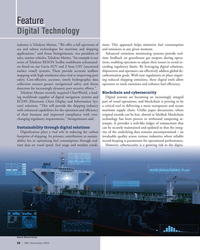 )
November 2024 - Marine News page: 28
)
November 2024 - Marine News page: 28outputs during opera- series of Teledyne RESON SeaBat multibeam echosound- tions, enabling operators to adjust their routes to avoid ex- ers ? tted on our Gavia AUV and Z boat USV [uncrewed ceeding regulatory limits. By leveraging digital solutions, surface vessel] systems. These provide accurate sea? oor
-
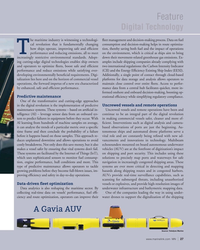 )
November 2024 - Marine News page: 27
)
November 2024 - Marine News page: 27leading the way in using under- ciency and route optimization, operators can improve their water drones to support the digitalization of the shipping A Gavia AUV Source: Teledyne Marine www.marinelink.com MN 27
-
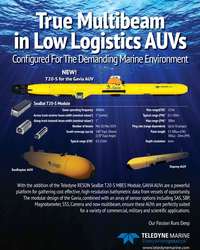 )
July 2024 - Marine Technology Reporter page: 4th Cover
)
July 2024 - Marine Technology Reporter page: 4th CoverAUVsin Low Logistics AUVs Conf igured For The Demanding Marine Environment Conf igured For The Demanding Marine Environment NEW! T20-S for the Gavia AUV SeaBat T20-S Module 3 Sonar operating frequency 400kHz Max range(CW) 225m 1 2 Across-track receiver beam width (nominal values ) 1° (center)
-
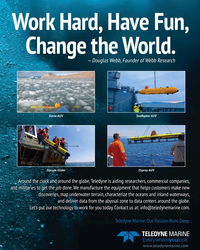 )
July 2023 - Marine Technology Reporter page: 4th Cover
)
July 2023 - Marine Technology Reporter page: 4th CoverWork Hard, Have Fun, Change the World. — Douglas Webb, Founder of Webb Research Gavia AUV SeaRaptor AUV Slocum Glider Osprey AUV Around the clock and around the globe, Teledyne is aiding researchers, commercial companies, and militaries to get the job done. We manufacture the equipment that helps customers
-
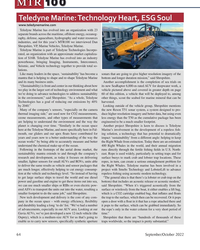 )
September 2022 - Marine Technology Reporter page: 64
)
September 2022 - Marine Technology Reporter page: 64be grabbed immediately. So of advancements, especially in our AUV area. Looking at our the rope’s only in the water column for a very short period of Gavia AUVs, we’ve just developed a new 12-inch vehicle (the time.” Osprey), which is a medium-size AUV for us that’s going to Shropshire that there are
-
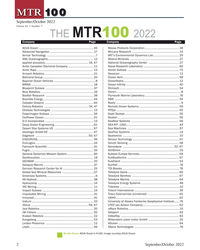 )
September 2022 - Marine Technology Reporter page: 2
)
September 2022 - Marine Technology Reporter page: 2.......................................................................76 Global Sea Mineral Resources .........................................27 Teledyne Gavia ..................................................................60 Greensea Systems ............................................................
-
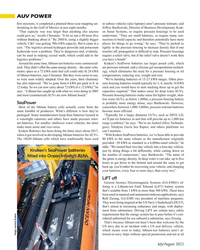 )
July 2022 - Marine Technology Reporter page: 36
)
July 2022 - Marine Technology Reporter page: 36, shallower water vehicles, the latter range (con? rm),” he says. “We’re on Anduril (Dive Technolo- make more sense and vice-versa. gies), Teledyne Gavia Sea Raptor, and others platforms we Kraken Robotics has been doing the latter since about 2017, can’t mention. when it got involved in developing
-
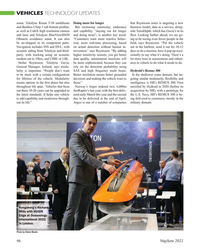 )
May 2022 - Marine Technology Reporter page: 46
)
May 2022 - Marine Technology Reporter page: 46business model; data as a service, along- as well as CathX high resolution camera and capability, “staying out for longer side TerraDepth, which has Gavia’s in its and laser and Teledyne BlueViewM450 and doing more”, is another key trend. ? eet. Looking further ahead, we are go- Obstacle avoidance
-
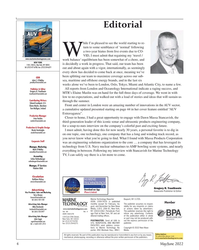 )
May 2022 - Marine Technology Reporter page: 4
)
May 2022 - Marine Technology Reporter page: 4some semblance of ‘normal’ following a two-year hiatus from live events due to CO- WVID, I must admit that regaining my ‘travel / Photo courtesy Teledyne Gavia www.marinetechnologynews.com work balance’ equilibrium has been somewhat of a chore, and NEW YORK is decidedly a work in progress. That said, our
-
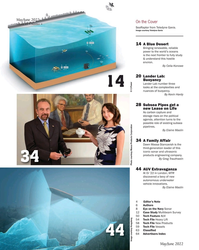 )
May 2022 - Marine Technology Reporter page: 2
)
May 2022 - Marine Technology Reporter page: 2May/June 2022 On the Cover Volume 65 • Number 4 SeaRaptor from Teledyne Gavia. Image courtesy Teledyne Gavia 14 A Blue Desert Bringing renewable, reliable power to the world’s oceans is the next frontier to fully study & understand this hostile environ. By Celia Konowe 20 Lander Lab:
-
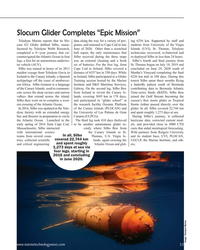 )
September 2020 - Marine Technology Reporter page: 53
)
September 2020 - Marine Technology Reporter page: 5318, 2019 and Silbo was named in honor of its 2011 Cape Cod to Ireland, Silbo covered a concluded on June 29, 2020 south of maiden voyage from Teledyne Gavia in distance of 6557 km in 330 days. While Martha’s Vineyard completing the ? nal Iceland to the Canary Islands, a Spanish in Ireland, Silbo participate
-
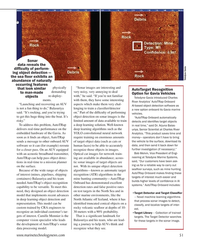 )
October 2020 - Marine Technology Reporter page: 51
)
October 2020 - Marine Technology Reporter page: 51Sonar data reveals the dif? culty of perform- ing object detection — the sea ? oor exhibits an Teledyne Gavia abundance of naturally occurring features physically “Sonar images are interesting and that look similar AutoTarget Recognition demanding very noisy, very annoying to deal to man-made
-
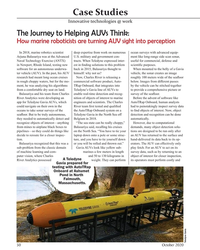 )
October 2020 - Marine Technology Reporter page: 50
)
October 2020 - Marine Technology Reporter page: 50solutions to this problem scienti? c purposes. software for an autonomous underwa- back in 2015, Balasuriya thought to When mounted to the belly of a Gavia ter vehicle (AUV). In the past, his AUV himself: why not us? vehicle, the sonar creates an image research had meant long ocean cruises Now, Charles
-
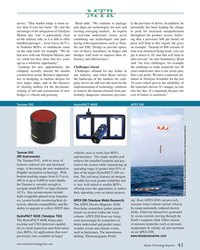 )
July 2020 - Marine Technology Reporter page: 41
)
July 2020 - Marine Technology Reporter page: 41believ- on the military side, as it is able to offer combining our technologies and part- ing that a pervasive $40 per barrel oil bundled packages – from Gavia AUV’s, nering with organizations such as Trim- price will help in this regard. He gives to Seabotix ROVs, to multibeam sonar ble and DSC Dredge
-
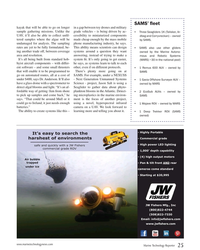 )
January 2020 - Marine Technology Reporter page: 25
)
January 2020 - Marine Technology Reporter page: 25automated routes, all at a cost of SAMS. For example, under a NEXUSS under $400, says Dr. Anderson. It’ll also - Next Generation Unmanned Systems • 1 Gavia Offshore Surveyor AUV – have a glass dome with a spectrometer to Science - project, Jason Salt is using a owned by MARS detect algal blooms and
-
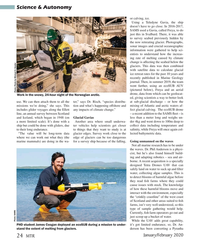 )
January 2020 - Marine Technology Reporter page: 24
)
January 2020 - Marine Technology Reporter page: 24Science & Autonomy or calving, ice. Using a Teledyne Gavia, the ship doesn’t have to go close. In 2016-2017, SAMS used a Gavia, called Freya, to do just this in Svalbard. There, it was able to survey seabed previously hidden by the now retreating glacier. Photographs, sonar images and crucial oceanograp
-
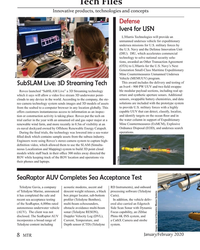 )
January 2020 - Marine Technology Reporter page: 8
)
January 2020 - Marine Technology Reporter page: 8ROV while keeping track of the ROV location and operations via their phones and laptops. L3 Harris SeaRaptor AUV Completes Sea Acceptance Test Teledyne Gavia, a company acoustic modems, ascent and RD Instruments), and onboard of Teledyne Marine, announced descent weight releases, a black processing
-
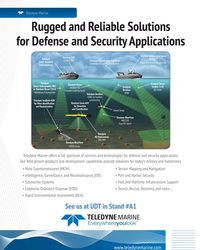 )
May 2019 - Marine Technology Reporter page: 1
)
May 2019 - Marine Technology Reporter page: 1T50 R Benthos 3D Sonar Forward Looking Sonar Multibeam Echosounder USBL Teledyne Benthos 86%/IRUWRZ¯VK positioning Teledyne SeaBotix ROV Teledyne Gavia AUV IRU0LQH,GHQWL¯FDWLRQ for Detection and Neutralization DQG&ODVVL¯FDWLRQ Towed Sonar Teledyne BlueView MB2250 Gap Fill Sonar Teledyne RD
-
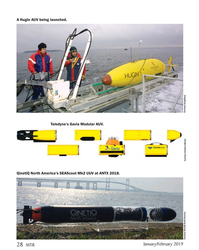 )
January 2019 - Marine Technology Reporter page: 28
)
January 2019 - Marine Technology Reporter page: 28A Hugin AUV being launched. Teledyne’s Gavia Modular AUV. Courtesy Teledyne Marine QinetiQ North America’s SEAScout Mk2 UUV at ANTX 2018. Courtesy QinetiQ North America Courtesy Kongsberg January/February 2019 28 MTR MTR #1 (18-33).indd 28 MTR #1 (18-33).indd 28 2/6/2019 3:37:37 PM2/6/2019 3:37:37
-
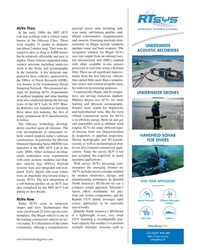 )
January 2019 - Marine Technology Reporter page: 27
)
January 2019 - Marine Technology Reporter page: 27? ler on an AUV was North America’s SEAScout we see a also completed by the MIT AUV Lab compact, simple approach. Teleynde’s during its ? rst decade. Gavia offers modularity for pay- load and system components, and the Riptide UUV family leverages open AUVs Now Marine MammalsOffshore Renewable Energies Today
-
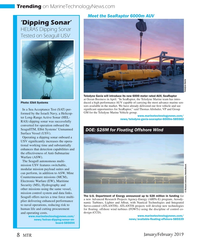 )
January 2019 - Marine Technology Reporter page: 8
)
January 2019 - Marine Technology Reporter page: 8Trending on MarineTechnologyNews.com Meet the SeaRaptor 6000m AUV ‘Dipping Sonar’ HELRAS Dipping Sonar Tested on Seagull USV Teledyne Gavia Teledyne Gavia will introduce its new 6000 meter rated AUV, SeaRaptor at Ocean Business in April. “In SeaRaptor, the Teledyne Marine team has intro- Photo: Elbit
-
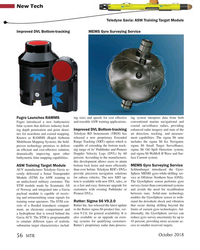 )
October 2018 - Marine Technology Reporter page: 56
)
October 2018 - Marine Technology Reporter page: 56New Tech Teledyne Gavia: ASW Training Target Module Improved DVL Bottom-tracking MEMS Gyro Surveying Service ing sizes and speeds for cost effective ing system interprets data from both Fugro Launches RAMMS Fugro introduced a new bathymetric and reusable ASW training applications. conventional marine
-
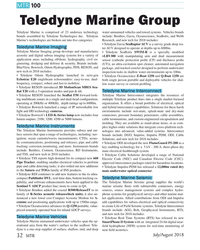 )
July 2018 - Marine Technology Reporter page: 32
)
July 2018 - Marine Technology Reporter page: 32technology water unmanned vehicles and towed systems. Vehicles brands brands assembled by Teledyne Technologies Inc. Teledyne include: Benthos, Gavia, Oceanscience, SeaBotix, and Webb Marine’s technologies are broken out into
